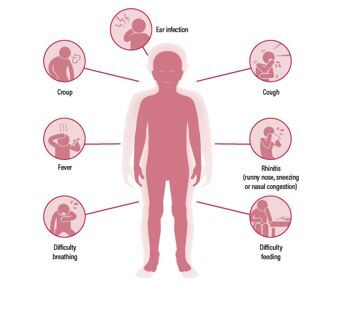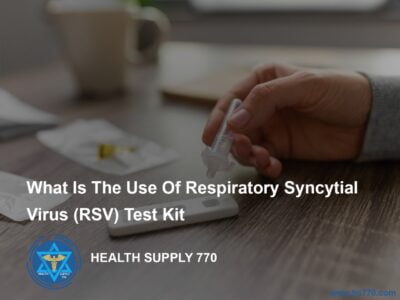The respiratory syncytial virus (RSV), also known as a human respiratory syncytial virus (RSV), is a common but contagious airborne virus that causes infection of the respiratory tract which means it affects your lungs, nose, and throat. It is one of the most common causes of respiratory hospitalization among infants and in later life it can happen again. This virus shows its symptoms within four to six after getting infected. Symptoms of RSV infection include :
• Sneezing
• Wheezing
• Fever
• Coughing
• A runny nose
• Loss of appetite
However, the RSV symptoms in infants may only include decreased activity, irritability, and difficulty in breathing. The symptoms of RSV usually do not appear at once but at different stages. There is no specific RSV treatment and it can go away on its own in one or two weeks.
However, RSV can be fatal for infants, elderly people, and children with heart or lung diseases because they already have weak immune systems. In these people, RSV can cause pneumonia and bronchiolitis which means the inflammation of the small airways of the lungs. RSV is more commonly spread in the winter.
Causes and complications of Respiratory Syncytial Virus (RSV)
RSV is a contagious infection which means that it passes from coming in close contact with people infected with RSV. It means if you are anywhere near a person who is infected with RSV, the infection might transfer to you by their cough or sneeze.
This virus can also be transferred by touching the things that were recently touched by an RSV infected person. RSV can cause serious complications among high risked individuals. For example, children can develop ear infections and croup which means severe inflammation of the vocal cords due to severe RSV. Also, children who develop bronchiolitis because of severe RSV can be at a higher risk of suffering from Asthma.
In extremely severe cases, the patient might need to be hospitalized and might be given oxygen by either inserting a tube into their throat or through a nasal cannula tubing attached to their nose.

Symptoms of an respiratory syncytial virus infection
Why do we need an RSV test?
It is true that most people recover from RSV within a week or two. But due to the complications that can arise in the case of the above mentioned high risk patients, it is necessary to test RSV in these patients to avoid complications and ensure timely treatment. These high risk patients include people with weakened immune systems, infants, elderly persons, and people with heart or lung disease. This testing is done using a sample of fluid from the nose. However, different methods are used to take these samples. Different ways to collect samples include
How an RSV test is done?
An RSV test is done by taking a sample in the following ways.
Nasal aspirate
In this method, a suction device is used by your doctor which helps to take out a sample of your nasal secretions. After this, the acquired sample is tested for the presence of RSV.
Nasal wash
In this method, a special tool with a saline solution is used by your doctor to suck out a sample of your nasal secretions which are then tested to identify the presence of RSV.
Nasopharyngeal (NP) swab
In this method, a small swab is inserted into your nostril by your doctor and is taken to the back of your nose. Then the doctor moves it around gently to take a sample and then it is removed from your nostril. The acquired sample is then tested for the presence of the virus so that proper treatment can be started timely.
What are the different tests used for RSV detection?
There are several laboratory tests used to detect RSV. The two most common tests that are used to diagnose RSV infection include:
Rapid RSV antigen tests
In this method, a sample from your nose is tested for antigens. These tests can provide instant results within an hour or less.
Molecular tests
These are also called RT-PCR. These tests check the genetic material from the RSV virus in your sample. These samples are usually tested in laboratories.
What is a Respiratory Syncytial Virus (RSV) test kit?
RSV test kits are at-home test kits that are used to collect samples at home and then these samples are sent to the laboratory for RSV detection and diagnosis. These test kits can be bought without any prescription and are often used to diagnose flu, and RSV together using only one sample. The test kits became popular and common due to the outbreak of the Corona virus when people preferred to use at-home kits for diagnosis. These test kits contain a nasal swab which is used to collect samples. After collecting the sample, it is sent to a lab for testing. You can get your test results online after the testing. These test results can also be interpreted on one’s own.
A study found that the RSV test kit can be effective to detect RSV in an earlier stage and is reliable for use in pediatrics as a diagnostic tool. Detection of the infection at an early stage can help to start treatment earlier and save the patient from severe symptoms and can be lifesaving among high risk patients.
Several test kits are available for use by individuals in the market with which you can collect your sample and send it back to them for testing. These test kits contain a nasal swab which you can use to collect samples and then it can be sent to the lab for testing. Several kits provide the option to test for flu, Covid-19, and RSV using a single swab.
What do the results mean?
The result of an RSV test can either be positive or negative. These test results can be tested from a lab or at home through the result determining instructions present in some testing kits.
A positive test result indicates that you have an RSV infection and may or may not be hospitalized. You may also not need any proper medication as RSV can go away on its own within one or two weeks. However, infants, young children, and older patients may be hospitalized if they have difficulty in breathing or have become dehydrated. Treatment is done using oxygen and intravenous fluids. In some more serious cases, a ventilator can also be used although its use is very rare.
A negative result of an RSV test indicates that you do not have RSV and that some other cause is responsible for the illness. However, it does not completely negate the presence of an RSV infection. It may be possible that there was not enough of the virus in the sample to find through the test.
Pros of using respiratory syncytial virus (RSV) test kit
The respiratory syncytial virus (RSV) test kit has several positives which include:
Convenience
These test kits can help you to take samples at your own pace without the need to go to a lab for testing. These samples are then sent to labs for testing and you get your results online. The entire process is convenient for the patients as they do not need to go to labs for sample collection and test results.
Testing in isolation
Since RSV is contagious, testing in isolation can be the ideal choice to prevent transferring the infection.
Options for test
Most of the test kits provide an option to detect flu, Covid-19, and RSV using one swab which makes the sample collecting process easier and simple.
Transparent pricing
The costs of the test done using test kits is all-inclusive and are clearly mentioned before taking the test.
The negatives of the Respiratory Syncytial Virus (RSV) test kit include:
Potential sample collection errors
In spite of the details included in the testing kit for sample collection, a sample collection errr may cause an invalid or inaccurate result.
Time delay of test results
Because this testing kit requires you to send your own collected samples for testing, it can take a long time to transfer samples to the lab and then testing.
Increased risk of cost wastage
Due to the potential sample collection errors and resulting invalid or inaccurate results, there is an increased risk of wasting your money if the test results are not accurate or helpful.
Out-of-pocket cost
As insurance mostly does not cover the cost of at-home testing kits, so you will have to pay for the testing kit yourself.
Conclusion
The respiratory syncytial virus is a contagious virus that can be life-threatening to high-risk patients including people with weakened immune systems, infants, young children, older people, and people with heart and lung diseases. Timely detection of the virus can help to save patients from severe symptoms including pneumonia and bronchiolitis.
A respiratory syncytial virus testing kit can be an effective diagnostic tool in the detection of the infection. It is easy to use and can be used at one’s own convenience and the results can be obtained easily after sending the samples to the laboratory or determining the results at home.

PhD Scholar (Pharmaceutics), MPhil (Pharmaceutics), Pharm D, B. Sc.
Uzma Zafar is a dedicated and highly motivated pharmaceutical professional currently pursuing her PhD in Pharmaceutics at the Punjab University College of Pharmacy, University of the Punjab. With a comprehensive academic and research background, Uzma has consistently excelled in her studies, securing first division throughout her educational journey.
Uzma’s passion for the pharmaceutical field is evident from her active engagement during her Doctor of Pharmacy (Pharm.D) program, where she not only mastered industrial techniques and clinical case studies but also delved into marketing strategies and management skills.
Throughout her career, Uzma has actively contributed to the pharmaceutical sciences, with specific research on suspension formulation and Hepatitis C risk factors and side effects. Additionally, Uzma has lent her expertise to review and fact-check articles for the Health Supply 770 blog, ensuring the accuracy and reliability of the information presented.
As she continues her PhD, expected to complete in 2025, Uzma is eager to contribute further to the field by combining her deep knowledge of pharmaceutics with real-world applications to meet global professional standards and challenges.








